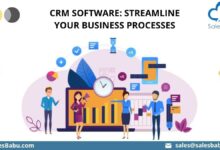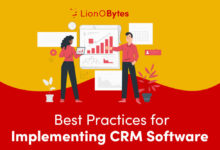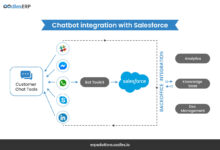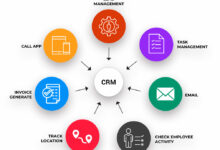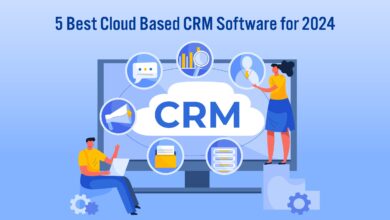Top Cloud-Based CRM Platforms: Enhancing Business Efficiency With Cutting-Edge Solutions
Top Cloud-Based CRM Platforms take center stage, offering businesses innovative solutions to streamline operations and boost productivity. In a rapidly evolving digital landscape, these platforms provide a competitive edge through advanced features and customizable options.
Businesses today are increasingly turning to cloud-based CRM platforms to optimize customer relationships, improve data security, and drive growth. With a focus on scalability, flexibility, and industry-specific solutions, these platforms are reshaping the way companies interact with their customers and manage their operations.
Overview of Cloud-Based CRM Platforms
Cloud-based CRM platforms are customer relationship management systems that are hosted on the cloud, allowing businesses to access and manage customer data and interactions remotely. Unlike traditional CRM systems that are hosted on-premise, cloud-based CRM platforms offer greater flexibility, scalability, and accessibility.
Benefits of Using Cloud-Based CRM Platforms
- Cost-effective: Businesses can save on hardware and maintenance costs as cloud-based CRM platforms are typically subscription-based.
- Accessibility: Users can access the CRM system from anywhere with an internet connection, enabling remote work and real-time collaboration.
- Scalability: Cloud-based CRM platforms can easily scale with the growth of the business, allowing for additional features and users to be added as needed.
- Data Security: Cloud CRM providers often have robust security measures in place to protect customer data from breaches and cyber threats.
Key Features of Top Cloud-Based CRM Platforms
- Customer Data Management: Allows businesses to store and organize customer information, such as contact details, interactions, and purchase history.
- Lead Management: Helps businesses track and manage leads throughout the sales pipeline, from initial contact to conversion.
- Automation: Enables businesses to automate repetitive tasks, such as email marketing campaigns, lead scoring, and follow-ups.
- Reporting and Analytics: Provides insights into customer behavior, sales performance, and overall business metrics to make data-driven decisions.
- Integration Capabilities: Allows for seamless integration with other business tools and systems, such as email marketing platforms, accounting software, and e-commerce platforms.
Leading Cloud-Based CRM Providers
When it comes to cloud-based CRM platforms, there are several leading providers that dominate the market. These providers offer a range of features and services to cater to the diverse needs of businesses.
Salesforce
Salesforce is one of the most well-known and widely used cloud-based CRM platforms in the market. It offers a comprehensive suite of tools for sales, marketing, customer service, and analytics. Salesforce’s pricing model is based on a per-user, per-month basis, with different tiers offering varying levels of functionality.
HubSpot
HubSpot is another popular cloud-based CRM provider that focuses on inbound marketing and sales. It offers a free CRM with additional paid features such as marketing automation, sales pipeline management, and customer service tools. HubSpot’s pricing model is also based on a per-user, per-month basis, with different pricing tiers depending on the features needed.
Microsoft Dynamics 365
Microsoft Dynamics 365 is a cloud-based CRM and ERP platform that integrates seamlessly with other Microsoft products. It offers a wide range of CRM and ERP functionalities, including sales, marketing, customer service, and operations. Microsoft Dynamics 365’s pricing model is based on a per-user, per-month basis, with different pricing tiers for different modules and features.
Zendesk
Zendesk is a cloud-based customer service software that also offers CRM capabilities. It is known for its user-friendly interface and customizable features. Zendesk’s pricing model is based on a per-agent, per-month basis, with different pricing tiers based on the level of customer service and support required.
Market Share and Popularity
In terms of market share and popularity, Salesforce leads the pack with a significant market share and a large customer base. HubSpot has also gained popularity, especially among small to medium-sized businesses looking for an all-in-one marketing and sales solution. Microsoft Dynamics 365 is preferred by larger enterprises due to its integration capabilities with other Microsoft products. Zendesk is popular among businesses focusing on customer service and support.
Customization and Integration Capabilities
Customization and integration capabilities are essential features of cloud-based CRM platforms that allow businesses to tailor their CRM systems to their specific needs and seamlessly integrate them with other tools and applications.
Customization Options
Cloud-based CRM platforms offer a wide range of customization options to meet the unique requirements of different businesses. Some common customization features include:
- Custom fields: Businesses can create custom fields to capture specific information relevant to their operations.
- Workflow automation: Automation tools allow businesses to streamline processes and workflows according to their preferences.
- Personalization: Users can personalize the interface and user experience to enhance productivity and efficiency.
Integration with Other Business Tools
Cloud-based CRM platforms are designed to easily integrate with other business tools and applications, enabling seamless data flow and communication across systems. Some key integration features include:
- Integration with email platforms: CRM systems can be integrated with email platforms like Outlook or Gmail for efficient communication management.
- Integration with marketing tools: Integration with marketing automation tools allows businesses to align sales and marketing efforts for better lead generation and conversion.
- Integration with accounting software: Seamless integration with accounting software streamlines invoicing and financial processes.
Successful Customization and Integration Strategies
Successful businesses have implemented effective customization and integration strategies to maximize the benefits of cloud-based CRM platforms. Some examples of successful strategies include:
- Customizing sales pipelines: Businesses can customize their sales pipelines to align with their unique sales processes and customer journey.
- Integrating CRM with customer support tools: Integration with customer support tools helps businesses provide seamless customer service and support.
- Automating data synchronization: Automating data synchronization between CRM and other systems ensures data consistency and accuracy across all platforms.
Security and Compliance Features
Cloud-based CRM platforms prioritize the security and compliance of user data to maintain trust and protect sensitive information. These platforms implement various measures to ensure data security and compliance with regulations.
Security Measures
- Encryption: Top cloud-based CRM platforms use encryption protocols to safeguard data both in transit and at rest, ensuring that only authorized users can access sensitive information.
- Access Control: Role-based access controls are implemented to restrict user permissions based on their roles within the organization, preventing unauthorized access to critical data.
- Regular Audits: Platforms conduct regular security audits to identify and address vulnerabilities, ensuring that the system remains secure against evolving threats.
Compliance with Regulations
- GDPR Compliance: Cloud-based CRM providers ensure compliance with the General Data Protection Regulation (GDPR) by implementing data protection measures and obtaining user consent for data processing.
- HIPAA Compliance: For healthcare organizations, platforms adhere to the Health Insurance Portability and Accountability Act (HIPAA) regulations to protect patient data and maintain confidentiality.
- PCI DSS Compliance: Platforms handling payment card information comply with the Payment Card Industry Data Security Standard (PCI DSS) to secure cardholder data and prevent fraud.
Recent Security Breaches and Compliance Issues
Recent years have seen cloud-based CRM providers facing security breaches and compliance challenges, highlighting the importance of robust security measures. For example, a major CRM platform experienced a data breach due to a vulnerability in their system, leading to unauthorized access to customer data. Additionally, some platforms have faced compliance issues related to data handling practices, resulting in penalties and reputational damage. These incidents emphasize the continual need for vigilance and proactive security measures in the cloud-based CRM industry.
User Interface and User Experience
When it comes to cloud-based CRM platforms, the user interface plays a crucial role in ensuring smooth navigation and user adoption. A well-designed interface can enhance the overall user experience and increase engagement with the system.
User Interface Design
- Popular cloud-based CRM platforms such as Salesforce, HubSpot, and Zoho CRM are known for their intuitive and user-friendly interfaces.
- These platforms often feature customizable dashboards, drag-and-drop functionality, and visually appealing layouts to make it easier for users to access and analyze data.
- Icons, color coding, and clear navigation menus are commonly used to improve usability and help users quickly find the information they need.
User Experience and Navigation
- The user experience within cloud-based CRM platforms is focused on streamlining workflows, reducing manual tasks, and providing a seamless interaction with customer data.
- Features like predictive analytics, automation tools, and mobile optimization contribute to a more efficient and user-friendly experience for CRM users.
- Intuitive search functionalities, customizable views, and easy data input methods enhance the overall navigation experience within these platforms.
Optimizing User Adoption
- Provide comprehensive training and support to help users familiarize themselves with the CRM platform and its features.
- Encourage feedback from users to identify areas for improvement and enhance the user experience based on their needs.
- Create personalized user experiences by customizing dashboards, reports, and notifications to align with individual user preferences and roles.
Mobile Accessibility and Features
Mobile accessibility is a crucial aspect of cloud-based CRM platforms, allowing users to access their customer data on-the-go, anytime, and anywhere. This feature enables users to stay connected and productive even when they are not at their desks.
Leading Cloud-Based CRM Platforms Mobile Accessibility
- Leading cloud-based CRM platforms like Salesforce, HubSpot, and Zoho CRM offer dedicated mobile apps for both iOS and Android devices.
- These apps provide a seamless user experience, optimized for mobile devices, ensuring easy navigation and accessibility to essential CRM functions.
- Users can view customer information, update records, track sales activities, and communicate with clients directly from their smartphones or tablets.
Key Mobile Features Enhancing Usability and Productivity
- Offline Access: Many cloud-based CRM platforms offer offline access features, allowing users to view and update data even when they are not connected to the internet.
- Push Notifications: Users receive real-time notifications on their mobile devices for important updates, new leads, or upcoming tasks, keeping them informed and engaged.
- Mobile Dashboards: Mobile CRM apps provide interactive dashboards with key metrics and reports, enabling users to monitor performance and make informed decisions on-the-go.
Examples of Businesses Benefiting from Mobile CRM Capabilities
- A sales team on the field can access customer data, update leads, and track sales activities in real-time using mobile CRM apps, leading to improved efficiency and faster response times.
- Service technicians can use mobile CRM apps to access service histories, update job statuses, and communicate with customers, enhancing customer satisfaction and service delivery.
- Marketing professionals can leverage mobile CRM apps to track campaign performance, manage leads, and collaborate with team members from anywhere, increasing marketing effectiveness and ROI.
Customer Support and Training Resources
Customer support and training resources are crucial aspects to consider when choosing a cloud-based CRM platform. Let’s delve into the customer support services, availability of training resources, and best practices for maximizing their benefits.
Customer Support Services
- Top cloud-based CRM providers offer various channels for customer support, including phone, email, live chat, and knowledge base.
- Response times and resolution times are key metrics to consider when evaluating the effectiveness of customer support services.
- Look for providers that offer 24/7 customer support to ensure timely assistance whenever needed.
- Some providers also offer dedicated customer success managers to assist with onboarding and ongoing support.
Training Resources and Documentation
- Leading cloud-based CRM platforms provide comprehensive training resources, including video tutorials, webinars, and online documentation.
- Users can access self-paced training modules to learn at their own convenience and pace.
- Look for platforms that offer regular training sessions and updates to help users stay current with the latest features and best practices.
- Online communities and forums can also be valuable resources for users to connect with peers and experts for additional support and guidance.
Best Practices for Maximizing Support and Training Benefits
- Encourage your team to actively engage with customer support for any questions or issues that arise during platform usage.
- Take advantage of training resources to ensure your team is well-equipped to leverage the full potential of the CRM platform.
- Regularly review and update your knowledge base to incorporate new features and functionalities to enhance user proficiency.
- Provide ongoing training and support to new hires to ensure a smooth onboarding process and continued adoption of the CRM platform.
Data Analytics and Reporting Tools
Data analytics and reporting tools are essential components of cloud-based CRM platforms that provide valuable insights to businesses for making informed decisions and improving overall performance.
Insights from Analytics Tools
- Tracking customer interactions: CRM platforms can analyze customer behavior, preferences, and engagement with the company, helping businesses tailor their marketing strategies accordingly.
- Forecasting sales trends: By analyzing past sales data and customer interactions, businesses can predict future sales trends and adjust their sales strategies accordingly.
- Identifying high-value customers: Analytics tools can help identify key customers who bring in the most revenue, allowing businesses to focus on retaining and nurturing these relationships.
Role of Data-Driven Decision-Making
- Data-driven decision-making: By utilizing the insights provided by analytics tools, businesses can make informed decisions based on data rather than assumptions, leading to more effective strategies and improved business outcomes.
- Improving business performance: Data-driven decision-making enables businesses to optimize their operations, enhance customer relationships, and drive revenue growth by leveraging the power of data analytics.
Scalability and Flexibility
Cloud-based CRM platforms offer unparalleled scalability and flexibility to businesses of all sizes, allowing them to adapt and grow seamlessly.
Scalability
One of the key advantages of cloud-based CRM platforms is their ability to scale effortlessly with the growth of a business. Companies can easily adjust their CRM resources, storage, and features as their customer base expands, without the need for significant infrastructure investments.
- Cloud-based CRM systems can accommodate a growing number of users, ensuring that all employees have access to the necessary tools and information.
- Businesses can increase or decrease their storage capacity based on their data requirements, without facing any limitations.
- Scalability also extends to performance, with cloud-based CRM platforms offering high availability and reliability even during periods of increased workload.
Flexibility
Cloud-based CRM platforms are highly flexible, allowing businesses to customize and adapt the software to meet their evolving needs and requirements.
- Companies can easily integrate new features, modules, or third-party applications into their CRM system to enhance functionality.
- Customization options enable businesses to tailor their CRM platform to specific industry requirements or unique business processes.
- Flexibility also extends to access, with cloud-based CRM solutions offering remote accessibility from any device, ensuring that employees can work efficiently from anywhere.
Case Studies
Several companies have successfully scaled their operations using cloud-based CRM solutions, showcasing the effectiveness of these platforms in supporting business growth.
Company X, a fast-growing e-commerce retailer, expanded its customer base by 200% after implementing a cloud-based CRM platform that enabled personalized marketing campaigns and streamlined customer interactions.
Company Y, a global tech firm, increased its sales by 30% year-over-year by leveraging the scalability of a cloud-based CRM system to manage leads, track customer interactions, and analyze sales performance in real-time.
Industry-Specific Solutions
In today’s competitive business landscape, having a CRM platform tailored to specific industries can provide companies with a significant advantage. Industry-specific CRM solutions are designed to meet the unique needs and requirements of businesses operating in sectors such as healthcare, real estate, and e-commerce. These specialized platforms offer features and functionalities that are specifically geared towards enhancing efficiency, productivity, and customer satisfaction within niche industries.
Healthcare CRM Solutions
- Customized patient relationship management tools for healthcare providers
- Integration with electronic health records (EHR) systems for seamless data sharing
- Compliance with industry regulations such as HIPAA for data security
Real Estate CRM Solutions
- Property listing management for real estate agents and brokers
- Lead tracking and automated follow-up for potential buyers and sellers
- Integration with MLS databases for up-to-date property information
E-Commerce CRM Solutions
- Customer segmentation and targeted marketing campaigns for online retailers
- Integration with popular e-commerce platforms like Shopify and Magento
- Automated order processing and inventory management features
Industry-specific CRM solutions have proven to be instrumental in driving business growth and success for companies operating in these niche sectors. By leveraging the unique features and functionalities offered by these platforms, businesses can streamline operations, improve customer engagement, and ultimately achieve their goals more effectively.
Ultimate Conclusion
In conclusion, Top Cloud-Based CRM Platforms offer a comprehensive suite of tools and features designed to meet the diverse needs of modern businesses. By leveraging the power of the cloud, companies can enhance customer engagement, streamline processes, and drive revenue growth. Embracing these platforms is not just a trend but a strategic imperative for staying competitive in today’s market.

